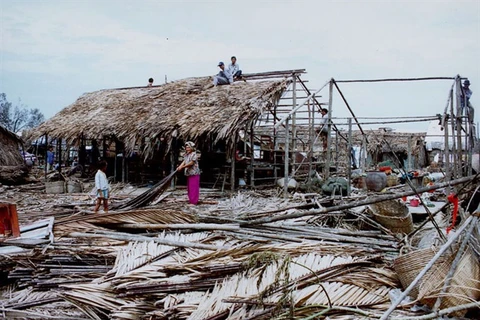Hanoi (VNA) – A workshop on ways to improve Vietnam’s marine warning and forecast capacity is taking place in Hanoi from October 22-25 as part of activities in the cooperation framework between the Vietnam Meteorological and Hydrological Administration (VMHA) and the Norwegian Meteorological Institute.
Addressing the event, Vice General Director of the VMHA Hoang Duc Cuong, said the administration has cooperated with the Norwegian institute since 2013 to carry out cooperation activities to better capacity for its staff.
The Norwegian institute has directly supported forecasters from hydro-meteorological stations under the VMHA in coastal areas in using the Diana forecasting software and the Regional Ocean Modeling System (ROMS) and the Open source framework for ocean trajectory modelling – OpenDrift.
According to Cuong, the VMHA and meteorological and hydrological stations in coastal areas have applied technologies to forecast tidal surges caused by storms and monsoon, spread of pollutants and floating objects on the sea to prevent natural disasters and build plans and solutions to deal with incidents at sea.
Thanks to practical support by the Norwegian institute in human resources training and technology transfer, since 2018, Vietnam’s marine forecast has recorded effective development, he noted.
The quality of the weather forecast bulletins has been remarkably improved, he stressed.
Norwegian Ambassador to Vietnam Grete Lochen said the cooperation between the two agencies has supported not only the forecast of tidal surges but also the use and exploitation of results of weather forecast models and tools.
Participant to the workshop discussed topics on the forecast of waves and tidal surges, and evaluated the quality of wave forecasts by satellite data, and technologies for forecasting the spread of pollutants and floating waste on the sea./.
Addressing the event, Vice General Director of the VMHA Hoang Duc Cuong, said the administration has cooperated with the Norwegian institute since 2013 to carry out cooperation activities to better capacity for its staff.
The Norwegian institute has directly supported forecasters from hydro-meteorological stations under the VMHA in coastal areas in using the Diana forecasting software and the Regional Ocean Modeling System (ROMS) and the Open source framework for ocean trajectory modelling – OpenDrift.
According to Cuong, the VMHA and meteorological and hydrological stations in coastal areas have applied technologies to forecast tidal surges caused by storms and monsoon, spread of pollutants and floating objects on the sea to prevent natural disasters and build plans and solutions to deal with incidents at sea.
Thanks to practical support by the Norwegian institute in human resources training and technology transfer, since 2018, Vietnam’s marine forecast has recorded effective development, he noted.
The quality of the weather forecast bulletins has been remarkably improved, he stressed.
Norwegian Ambassador to Vietnam Grete Lochen said the cooperation between the two agencies has supported not only the forecast of tidal surges but also the use and exploitation of results of weather forecast models and tools.
Participant to the workshop discussed topics on the forecast of waves and tidal surges, and evaluated the quality of wave forecasts by satellite data, and technologies for forecasting the spread of pollutants and floating waste on the sea./.
VNA























